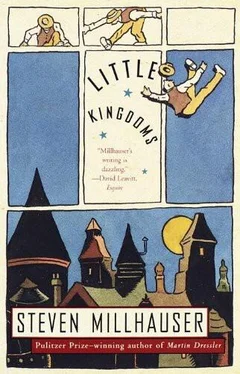THE PRINCE’S DOUBTS INCREASE . Now nightly the Prince drove his wife to the margrave’s chamber, and restlessly awaited her return; and every morning the Princess returned to say that the margrave had remained steadfast. The Prince, tormented by the growing certainty that he was being deceived, and exasperated by the hope born of her daily assurances, longed for proof of her faithlessness, in order to ease his heart of uncertainty. One night, sorrowing alone, he remembered suddenly a time before his life had taken a crooked turn. He and the Princess were walking in the park, in the avenue of acacias, and something he had said made her laugh aloud; and the sound of that laughter, and the sunlight pouring down through the acacia leaves onto the graveled path, and the Princess’s throat, half in sun and half in trembling shade, seemed as remote and irrecoverable as his own childhood. At that moment he saw with terrible clarity what he had done. He vowed to beg forgiveness on his knees and not to rise until he was permitted to return to his lost paradise. But even as he imagined the Princess laughing in the sun and shade of the acacia path, he saw her hand rise to her throat as she turned from the window, where a devil with a sharp beard and amethyst jewels on his mantle leaned motionless against the shadowed stone.
SCARBO. Among the many devoted servants of the Prince was a dwarf, whose name was Scarbo. He was a proud little man, with stern features and a small pointed beard; he dressed in the latest fashion, was a master of court etiquette and of all questions concerning precedence, and was noted for his disdainful glance, his penetrating intelligence, and his unswerving devotion to the Prince. Once, after a courtier had humiliated the little man by picking him up and tossing him lightly in the air, while others had watched with smiles and laughter, Scarbo lay on his bed in silent fury for two nights and two days. On the third night he crept into the bedchamber of the offending courtier and plunged his little sharp sword into the sleeper’s throat. After that he cut off both of the dead man’s hands and laid them with interlocked fingers on the coverlet. The Prince forgave his dwarf, but sentenced him to a month in prison; some say he was confined in the dungeon itself, and absorbed its darkness into his soul. But if his proud and disdainful nature was immediately apparent, earning him an uneasy respect never far from ridicule, Scarbo’s most remarkable feature was his delicacy of feeling — for he possessed a highly developed and almost feminine sensitivity to the faintest motions of another person’s mood. This unusual development in the realm of feeling, born perhaps of an outsider’s habit of extreme watchfulness, increased his danger as an enemy and his value as a trusted servant and councillor. Combing his beard in his private chamber, handing the Prince a goblet of ruby wine, listening at night to the footsteps of the Princess moving past his door toward the margrave’s chamber, the dwarf knew that it was only a matter of time before the Prince would summon him.
STORIES. Our town takes pride in the practical and useful arts. We are well known for our door panels and brass hinges, our stove tiles and weather vanes, our tomb effigies and stone crucifixes, whereas our literature rarely rises above the level of doggerel verses, carnival plays, and dull philosophical poems in monotonous meters and rigid rhymes. Our imagination is far better expressed in the famous work of our metal masters, above all in the brilliant productions of our church-bell casters, our bladesmiths, our makers of spice mills, astrolabes, and articulated figures for clocks. And yet it would be a mistake to think of us as entirely deficient in the art of the word. Although we are practical citizens, who keep our accounts strictly and go to bed early, we have all listened to tales in the nursery, tales that are never written down but may appear suddenly in distorted or fragmentary form in a song heard in a tavern or at a carnival play; and foremost among these stories of our childhood are tales of the castle. The same tales are told by minstrels in the courtyards of inns, and sung by peasants in the fields and villages of our territorial domain. In another form the tales show themselves in the early parts of our chronicles, where legend and fact are interwoven, and many episodes have been joined together by unknown hands and written down on sheets of parchment, which are bound in ivory and metal on wood, purchased by wealthy merchants, and read by their wives. Such stories, reaching far down into the deepest past of our town, attach themselves likewise to the castle of the present day, so that the actual dwellers in the castle come to seem nothing but passing actors asked to perform the changeless gestures of an eternal play. Thus it comes about that, although we are practical and commercial by nature, we too have our stories.
THE SUMMONS. One morning after a night of shattering dreams the Prince summoned his dwarf to a private chamber and informed the little man that he desired a service of him. Scarbo bowed, noting once again the signs of change in his master and saying that he desired only to be of service to his Prince. With a show of impatience the Prince said that of late he had been preoccupied with pressing affairs, that he feared the Princess was too much alone, and that he desired his dwarf to spend more time in her company, attending to her needs, listening to her thoughts, and serving her in every way; and he further desired that he should report to the Prince each morning, concerning the state of her happiness. The dwarf understood instantly that he was being asked to spy on the Princess. His pride thrilled at the gravity of the mission, for the Prince was in effect conspiring with his dwarf against his own wife, but Scarbo recognized a danger: the Prince, while desiring evidence against the Princess, would not necessarily welcome the proof he sought, nor be grateful to his spy for easing his way into his wife’s confidence and ferreting out her secrets. It would not do to be overzealous in the performance of his duty. Wariness was all.
ON VAGUENESS AND PRECISION. It is precisely because of our ignorance that we see across the river with such precision. We know the precise carvings on the capital of each stone pillar and the precise history of each soul: they are transparent to our understanding. On our side of the river, even the most familiar lanes bear surprises around well-known bends; we see only a certain distance into the hearts of our wives and friends, before darkness and uncertainty begin. Perhaps, after all, this is the lure of legend: not the dreamy twilight of the luxuriating fancy, in love with all that is misty and half-glimpsed, but the sharp clarity forbidden by our elusive lives.
A WALK IN THE GARDEN. One sunny afternoon the Princess, who had been walking in the courtyard, dismissed her ladies-in-waiting at the garden gate and entered her garden alone. The walls were higher than her head; paths of checkered stone ran between beds of white, red, and yellow flowers; at one end stood a small orchard of pear, apple, quince, and plum trees. In the center of the garden, surrounded by a tall hedge with a wicker gate, stood the Princess’s bower, shaped like a pavilion and composed of trelliswork covered with vines. The Princess, in her azure tunic and her heart-shaped headdress, walked with bowed head among the fruit trees of the orchard, raising her eyes at the slightest noise and looking swiftly about. After a time she began to walk along the paths of checkered stone between the flower beds, passing two turf-covered benches, an octagon of white and red roses, and a white jasper three-tiered fountain with a column surmounted by a unicorn. At the central hedge she hesitated and seemed to listen; then she pushed open the gate and entered, bending low under a trellised arch. In the green shade of her bower sat two couches covered in crimson silk. Scarbo, seated in the corner of a couch, at once stood up and bowed. The Princess sat down stiffly on the couch opposite and stared as if harshly at the dwarf, who met her gaze and did not turn his eyes aside. “I cannot do what you propose,” she began, in a toneless voice. The dwarf, rigid with attention, listened patiently. He was well pleased with his progress.
Читать дальше












